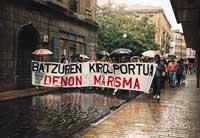Marina of some, common marsh
June 25, 1994, Zumaia. Along the streets of this small coastal town of Gipuzkoa, nearly a thousand people demonstrated under the slogan above, to denounce the intention of the City Council and the Secretariat of Ports of the Basque Government to build a marina in the area of the Santixo marsh.
So far it has been useless that the Department of Urbanism, Housing and Environment approves and exalts the ecological values of this aspect, is integrated into the “Catalogue of Natural Parks of Euskadi” or is declared as a strictly integral part of the “Land Management Rights” (DOT).
The protests launched by various scientific and environmental institutions have also been useless, or that the coast law declares that this aspect is of public utility, prohibiting changes or the construction of infrastructure. This makes clear that there is no law that breaks the savage and irrational development of our politicians, and that laws do not apply equally to all citizens.

However, the case of Zumaia in general is only the clearest example of one of the biggest ecological problems facing the entire Basque coast: the example of “fever in marinas”.
In fact, important ecological aspects that have escaped the abrupt change suffered by the Basque coast in recent years are threatened by the marina. These have been sold as a panacea for peoples without need or environmental study.
But the reality is different. The Mediterranean experience has shown that marinas hardly generate employment. The strong changes in the natural attractions and the enormous speculation provoked by the inhabitants of these villages face serious socio-economic problems.
In addition, most of the spaces chosen for the construction of marinas in the Basque Country (Zumaia-Santixo, Plentzia-Txipio, Donostia-Monpas, Angelu-Txiberta, etc.) Given that from the ecological point of view they are very sensitive, there is no doubt that the time has come for a serious reflection on this issue.
Meanwhile, the administration should stop projects at all marinas until an investigation is conducted that defines the real need for these facilities. Next, it would be necessary to decide which are the most suitable places to locate these ports, for which should be taken into account as a determining factor the ecological values of each part.
If we don't want to see our coast full of concrete and cement, it's time to say it's enough.





